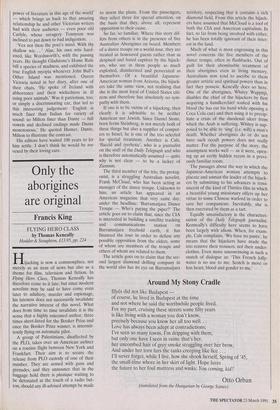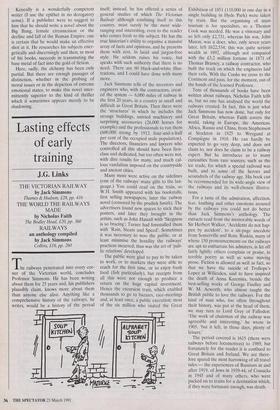Only the aborigines are original
Francis King
FLYING HERO CLASS by Thomas Keneally Hodder & Stoughton, £13.95, pp. 224 Hijacking is now a commonplace, not merely as an item of news but also as a theme for film, television and fiction. In Flying Hero Class, Thomas Keneally has therefore come to it late; but since modern novelists may be said to have come even later to adultery, murder and espionage, his lateness does not necessarily invalidate the narrative interest of this novel. What does from time to time invalidate it is the sense that a highly esteemed author, three times short-listed for the Booker Prize and once the Booker Prize winner, is intermit- tently flying on automatic pilot.
A group of Palestinians, disaffected by the PLO, takes over an American airliner on a routine flight between New York and Frankfurt. Their aim is to secure the release from PLO custody of one of their number. They are armed with guns and grenades, and they announce that in the baggage hold there is plastique waiting to be detonated at the touch of a radio but- ton, should any ill-advised attempt be made to storm the plane. From the passengers, they select three for special attention, on the basis that they, above all, represent opposition to their cause.
So far, so familiar. Where this story dif- fers from others is in the presence of five Australian Aborigines on board. Members of a dance troupe on a world-tour, they are treated as honoured guests rather than as despised and hated captives by the hijack- ers, who see in them people as much exploited, disinherited and persecuted as themselves. Of a beautiful Japanese- American woman from Arizona, the hijack- ers take the same view, not realising that she is the most loyal of United States citi- zens and therefore has absolutely no sym- pathy with them.
If one is to be victim of a hijacking, then clearly it is advisable to be neither American nor Jewish. Since Daniel Stone, born Ivrim Steinberg, is not merely both of these things but also a supplier of comput- ers to Israel, he is one of the trio selected for special treatment. Another is Cale, 'flaccid and cyrrhotic', who is a journalist on the staff of the Daily Telegraph and who is therefore automatically assumed — quite why is not clear — to be a lackey of Zionism.
The third member of the trio, the protag- onist, is a struggling Australian novelist, Frank McCloud, who has been acting as manager of the dance troupe. Unknown to him, an article has appeared in an American magazine that very same day, under the headline: `Barramatjara Dance Troupe — Who's paying the piper?' The article goes on to claim that, since the CIA is interested in building a satellite tracking and communications station on Barramatjara freehold earth, it has financed the tour in order to defuse any possible opposition from the elders, some of whom are members of the troupe and others of whom are related to them.
The article goes on to claim that the sec- ond largest diamond drilling company in the world also has its eye on Barramatjara territory, suspecting that it contains a rich diamond field. From this article the hijack- ers have assumed that McCloud is a tool of both the CIA and American capitalism. In fact, so far from being involved with either, he has been totally ignorant of their inter- est in the land.
Much of what is most engrossing in this novel concerns the five members of the dance troupe, often in flashbacks. Out of guilt for their abominable treatment of their aborigines even in living memory, Australians now tend to ascribe to them greater artistic and spiritual powers than in fact they possess. Keneally does so here. One of the aborigines, Whitey Wappitji, disables the chief of the hijackers by first acquiring a handkerchief soaked with his blood (he has cut his hand while opening a Coca Cola can) and then using it to precip- itate a crisis of the duodenal ulcer from which the Arab is suffering. Whitey is sup- posed to be able to 'sing' (i.e. will) a man's death. Whether aborigines do or do not have such occult powers does not really matter. For the purpose of the story, the assumption works well — as it were, open- ing up an eerily hidden recess in a previ- ously familiar room.
The passages about the way in which the Japanese-American woman attempts to placate and unman the leader of the hijack- ers by submitting to his advances is remi- niscent of the kind of Thirties film in which a beautiful young missionary offers up her virtue to some Chinese warlord in order to save her companions. Inevitably, she is then execrated by them as a tart.
Equally unsatisfactory is the characteri- sation of the Daily Telegraph journalist. Kenneally's difficulty here seems to have been largely with idiom. When, for exam- ple, Cale complains, 'We have no pants', he means that the hijackers have made the trio remove their trousers, not their under- clothes. Even more unconvincing is such a snatch of dialogue as: 'This French lolly- water is no use to me. Scotch is more or less heart, blood and gender to me.'
Keneally is a wonderfully competent writer (I use the epithet in no derogatory sense). If a publisher were to suggest to him that he should write a novel about the Big Bang, female circumcision or the decline and fall of the Roman Empire, one is certain that he would make an effective shot at it. He researches his subjects ener- getically and discerningly and then, in most of his books, succeeds in transmuting the base metal of fact into the gold of fiction.
Here, sadly, the alchemy has been only partial. But there are enough passages of distinction, whether in the probing of moral issues or in the depiction of extreme emotional states, to make this novel inter- mittently superior to the kind of thriller which it sometimes appears merely to be shadowing.



























































 Previous page
Previous page